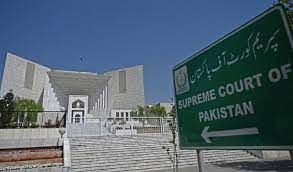ISLAMABAD (Agencies): In a major development, an eight-member larger bench of the Supreme Court (SC) on Thursday ordered that even if the Supreme Court (Practice and Procedure) Bill 2023 received the assent of the president, the bill would not be acted upon in any manner till further order.
The top court’s eight-member larger bench — headed by Chief Justice of Pakistan (CJP) Umar Ata Bandial and comprising Justice Ijaz ul Ahsan, Justice Munib Akhtar, Justice Sayyed Mazahar Ali Akbar Naqvi, Justice Muhammad Ali Mazhar, Justice Ayesha A Malik, Justice Syed Hasan Azhar Rizvi and Justice Shahid Waheed — issued its eight-page ruling on three petitions challenging the SC bill. “The moment that the Bill receives the assent of the President or (as the case may be) it is deemed that such assent has been given, then from that very moment onwards and till further orders, the Act that comes into being shall not have, take or be given any effect nor be acted upon in any manner,” read the interim order.
The larger bench of the top court heard the petitions challenging the SC bill 2023 amidst a boycott of court proceedings by the country’s top lawyers body and criticism of the coalition government. At the outset of the hearing, the petitioner’s lawyer Imtiaz Siddiqui started his arguments by saying that this case is very important in the prevailing situation.
The counsel said that differences widened between the parties in the wake of the Qasim Suri case and the political crisis increased after the National Assembly was restored. “The federal government and the Election Commission of Pakistan (ECP) are not willing to hold elections which is why the court had to take suo motu notice,” said Siddiqui, while highlighting the circumstances in which the apex court intervened in the matter.
The lawyer said that the problems created following the court’s directives to implement the Constitution after which the judges and judiciary were criticised. “The government’s ministers and members of parliament are responsible for this,” said the lawyer, adding that the proposed legislation interfered with the independence of the judiciary. He said that the president’s objections to the bill were not examined. Siddiqui said that the bill will become law after the approval of a joint session of the parliament in 10 days.
He said that the Supreme Court makes its own rules under Article 191. A three-member committee will decide on the formation of benches and taking up suo motu notice under the bill, the lawyer said, while explaining the important points of the bill. “It is illegal for the cabinet to endorse a bill. Presenting and approving a bill in the cabinet are administrative matters,” he noted.
He further said that the bill is not pending but is a proposed act, adding that it would become law in 10 days whether or not the president approves it. Lawyer Siddiqui said that the Supreme Court can nullify the bill passed by the parliament. “The Supreme Court does not exist without the chief justice and by limiting his powers, the judiciary’s independence and other judges will be affected,” remarked the lawyer.
He further said that the CJP and the judges’ powers cannot be curtailed. Siddiqui added that the apex court can review the steps taken by the state’s institutions. “The court can review the bill once it is passed and even before it is approved by the president,” he insisted. Siddiqui observed that the parliament is bound to obey the orders given by the Supreme Court.
“The Supreme Court’s rules under Article 191 cannot be amended by the parliament,” he said. In his response to the lawyer, CJP Bandial said: “According to you, the freedom of judiciary is a basic right which enjoys complete security by the Constitution.” He added that similarly, “you [Siddiqui] think that the judiciary also has constitutional security just like the parliament and executive.”
Siddiqui replied that the president is a symbol of unity of the state of Pakistan and his position as the head of state is not just ceremonial. “The president directed to review the bill once again, however, the bill cannot be amended after the approval of the assembly,” he said, adding that the process of legislation is considered done once it is passed. Advocate Siddiqui requested the court to stop the bill from becoming law and the Ministry of Law should be restrained from notifying the proposed act as a law until the verdict is announced.
Siddiqui said that there is a right to appeal under the proposed bill. “How can an appeal be filed if a 10-member bench hears a case? Can junior judges hear the appeal against the verdict announced by senior judges?” he questioned. At this, CJP Bandial replied that all the judges in the court are equal. Advocate Siddiqui said that the stages before the approval of the bill should also be taken into consideration in this case.
“What do you want from the court regarding this current case?” questioned Justice Akhtar. To this, the lawyer said that the Supreme Court (Practice and Procedure) Bill, 2023 should be declared unconstitutional. CJP Bandial remarked that this is an important case as the matter regarding the judiciary’s independence was raised. “We have the utmost respect for the parliament, however, the court wants to examine the legislation,” he stated.
The chief justice said that the court will try to schedule the next hearing as soon as possible when fellow judges are available. Later, the SC issued notices to the parties in the petitions filed against the bill clipping CJP’s powers including Pakistan Bar Council and Supreme Court Bar Association. The apex court also issued notice to the attorney general for legal assistance, adjourning the hearing till next week.







